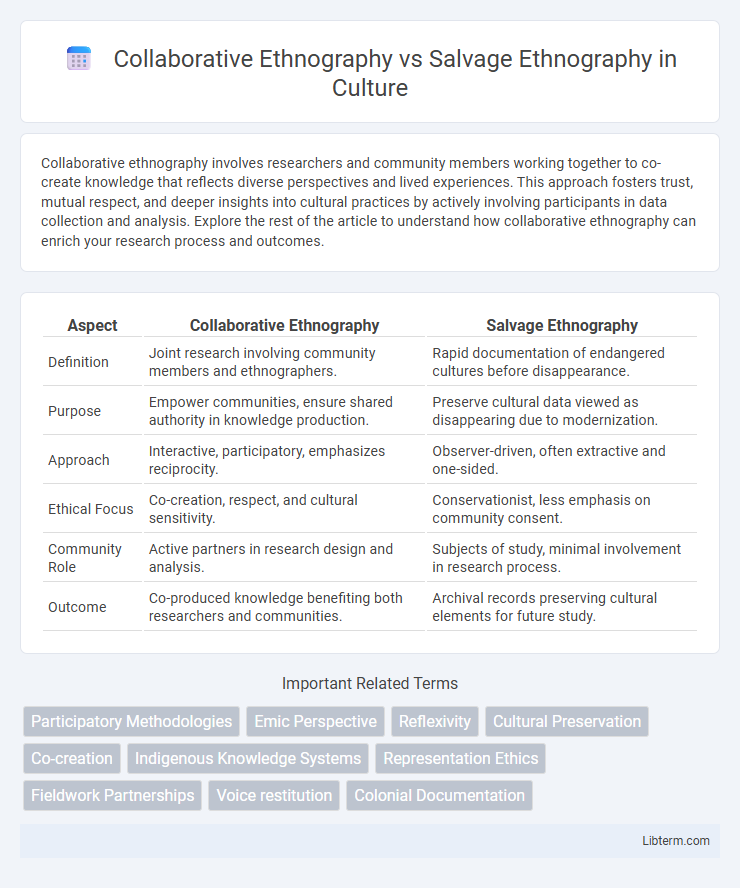Collaborative ethnography involves researchers and community members working together to co-create knowledge that reflects diverse perspectives and lived experiences. This approach fosters trust, mutual respect, and deeper insights into cultural practices by actively involving participants in data collection and analysis. Explore the rest of the article to understand how collaborative ethnography can enrich your research process and outcomes.
Table of Comparison
| Aspect | Collaborative Ethnography | Salvage Ethnography |
|---|---|---|
| Definition | Joint research involving community members and ethnographers. | Rapid documentation of endangered cultures before disappearance. |
| Purpose | Empower communities, ensure shared authority in knowledge production. | Preserve cultural data viewed as disappearing due to modernization. |
| Approach | Interactive, participatory, emphasizes reciprocity. | Observer-driven, often extractive and one-sided. |
| Ethical Focus | Co-creation, respect, and cultural sensitivity. | Conservationist, less emphasis on community consent. |
| Community Role | Active partners in research design and analysis. | Subjects of study, minimal involvement in research process. |
| Outcome | Co-produced knowledge benefiting both researchers and communities. | Archival records preserving cultural elements for future study. |
Introduction to Ethnographic Methods
Collaborative ethnography emphasizes active participation and partnership between researchers and community members, fostering mutual interpretation and co-creation of knowledge. Salvage ethnography aims to document and preserve cultural practices and languages at risk of disappearing, often prioritizing data collection over ongoing community involvement. Both methods are foundational in ethnographic research, highlighting diverse approaches to cultural understanding within the introduction to ethnographic methods.
Defining Collaborative Ethnography
Collaborative ethnography is a research methodology emphasizing active cooperation between ethnographers and the community members studied, ensuring shared authority and co-creation of knowledge. This approach contrasts with salvage ethnography, which seeks to document cultures perceived as endangered, often without involving community participation. Collaborative ethnography prioritizes ethical engagement, mutual respect, and aims to produce more nuanced, culturally grounded insights.
What is Salvage Ethnography?
Salvage ethnography involves documenting and preserving the cultural practices, languages, and artifacts of indigenous or marginalized communities believed to be disappearing due to modernization or external pressures. This approach emphasizes recording traditions before they are lost, often prioritizing preservation over collaboration with the community members. In contrast, collaborative ethnography fosters active participation and shared authorship with the community, emphasizing mutual respect and co-creation of knowledge.
Historical Contexts of Both Approaches
Collaborative Ethnography emerged in the late 20th century as a response to colonial research practices, emphasizing partnership between anthropologists and indigenous communities to co-produce knowledge and prioritize ethical considerations. Salvage Ethnography, prominent during the late 19th and early 20th centuries, was driven by the urgency to document Indigenous cultures perceived as "vanishing" due to colonization, often resulting in extractive and one-sided data collection. The historical contexts of both approaches reflect shifting power dynamics and ethical standards in anthropological research, where Collaborative Ethnography seeks to redress past injustices inherent in Salvage Ethnography.
Methodological Differences
Collaborative ethnography emphasizes active participation and shared authority between researchers and community members, promoting co-creation of knowledge and ethical engagement throughout the research process. Salvage ethnography focuses on the urgent documentation of cultures perceived as endangered, often prioritizing collection over collaboration and frequently resulting in researcher-centric narratives. Methodologically, collaborative ethnography employs iterative dialogues and reflexivity to ensure community perspectives shape findings, while salvage ethnography relies on rapid fieldwork and artifact preservation, sometimes at the expense of contextual nuance and participant agency.
Roles of Researchers and Participants
Collaborative ethnography emphasizes active participation and partnership between researchers and community members, allowing participants to co-construct knowledge and influence research processes, whereas salvage ethnography positions researchers as primary knowledge collectors aiming to preserve endangered cultures with limited participant involvement. Researchers in collaborative ethnography adopt roles as facilitators and co-investigators, fostering mutual respect and ethical engagement, while salvage ethnographers often maintain authoritative control over data interpretation and dissemination. The shift in roles highlights a move from extractive research methods toward inclusive practices that value indigenous perspectives and self-representation.
Ethical Considerations and Implications
Collaborative ethnography prioritizes ethical engagement by involving community members as active partners in research design, interpretation, and dissemination, ensuring respect for their agency and cultural integrity. Salvage ethnography often risks ethical pitfalls by extracting knowledge from marginalized groups without their consent or collaboration, potentially leading to cultural misrepresentation and exploitation. Ethical considerations in collaborative ethnography enhance trust, accuracy, and empowerment, contrasting with salvage ethnography's tendency toward objectification and loss of indigenous voices.
Impact on Cultural Representation
Collaborative ethnography fosters more authentic and respectful cultural representation by involving community members as active partners in the research process, which helps to counteract misinterpretation and misrepresentation commonly found in traditional studies. Salvage ethnography, by contrast, often prioritizes the preservation of cultural artifacts and practices without adequately engaging communities, risking an incomplete or static portrayal that may reinforce stereotypes. The impact on cultural representation is significant; collaborative approaches promote dynamic, self-represented narratives, while salvage ethnography can unintentionally freeze cultures in time or distort their evolving identities.
Critiques and Contemporary Relevance
Collaborative ethnography challenges traditional power imbalances by involving community members as active participants, critiqued for potential biases and negotiated meanings that may affect objectivity. Salvage ethnography, often criticized for its extractive nature and tendency to romanticize disappearing cultures, faces ethical scrutiny in contemporary anthropology. The growing emphasis on decolonizing methodologies highlights collaborative ethnography's relevance, promoting ethical engagement and shared authority in cultural representation.
Future Directions in Ethnographic Practice
Collaborative ethnography emphasizes participatory methods that engage community members as active co-researchers, fostering more ethical and inclusive future research models. In contrast, salvage ethnography, historically focused on preserving vanishing cultures, faces critiques for its extractive tendencies, pushing ethnographers to adopt approaches prioritizing reciprocity and ongoing community involvement. Emerging trends in ethnographic practice advocate for blending collaborative techniques with digital tools and interdisciplinary perspectives to enhance cultural preservation while respecting indigenous autonomy.
Collaborative Ethnography Infographic

 libterm.com
libterm.com